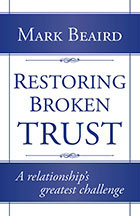Excerpts from Restoring Broken Trust
The Benefits of Forgiving(Chapter 4)
“Not to promote what some might see as a selfish mentality, but I would suggest a starting point for the person who has been hurt might be to consider the truth, that in many ways, forgiveness will benefit her far greater than the person being forgiven. Accordingly, one should primarily forgive for her own sake. Yes, that may sound selfish, but it is honest and it is best. The reality of being human is that people rarely do anything that does not benefit them. This is no time to be a martyr, or conversely, to play the role of a person who is above being hurt deeply. You don’t have to tell anyone you are forgiving first for your own well-being, nevertheless, if you don’t start with your own welfare, your commitment to follow through on forgiving could be short-lived. It could even die altogether the moment the person who broke your trust speaks or behaves in an insensitive way toward your feelings.”
The Nature of Trust(Chapter 5)
“The problem is not with the act of trusting others or being vulnerable. It is the way we develop lasting, deep, meaningful relationships that will enrich our lives. The problem is that we are sometimes careless or unwise in extending our trust. We do not always communicate well our expectations to others. We can expect too much. We can demand too much. We can expect too little. We can give too little. We can get sloppy in our relationships or not tend to them as we should. We can even allow the wrong people into our lives. A different approach to trusting others is what we often need, not to abandon all hope of being able to trust others.”
The Nature of Trust(Chapter 5)
“Balance is the key. The person who broke the trust can’t be given a blank check of credibility, but neither can the person be deprived of the basic dignity and self-worth needed to motivate him or her to good works. Even if someone breaks our trust, it is not our place to punish the person. Our focus must be to rebuild the relationship if we want it to survive. As distasteful as it may sound, if we want the other person to become trustworthy again, we must treat him or her as if we see this as a real possibility.”
Our Initial Response to the Hurt(Chapter 7)
"Offer a Measure of Grace. When I say “grace” I mean mercy, understanding, or leniency. When I say a “measure” I mean a deliberate amount so as to give the other person hope, but not so much as to imply quickly dismissing it. Remember, we are talking about an initial response while the hurt or disappointment is still fresh and there has not been enough to resolve the issue. This is not about keeping the other person “on the hook” or to keep them guessing or in the dark as to whether or not you are going to forgive them. Only to contend that slamming the door on any possibility of forgiveness or the likelihood of it will only serve to close you off emotionally to the other person and to discourage him or her from trying to make amends. The gift of hope is in the hand of the person wronged. Giving the gift to the other person is your choice."
Buy the Book
 Wait! Before discarding that relationship or giving up on having a healthy relationship with someone you love, know there is hope. The broken trust in our relationships can often be restored. In Restoring Broken Trust: A relationship's greatest challenge, you will find many of the answers to why trust is broken, what goes wrong in relationships, and what can be done to make the relationship healthy again. Mark Beaird draws insights and practical guidance from many years of experience in the helping professions and as a professional counselor to address the question he has been asked so many times, "Can the trust ever be restored?" The good news is there is a way trust can be restored. So, before you or someone else labels a spouse, family member, child, teen, friend, or other as "untrustworthy" and gives up all hope, consider the insights waiting for you in Restoring Broken Trust.
Wait! Before discarding that relationship or giving up on having a healthy relationship with someone you love, know there is hope. The broken trust in our relationships can often be restored. In Restoring Broken Trust: A relationship's greatest challenge, you will find many of the answers to why trust is broken, what goes wrong in relationships, and what can be done to make the relationship healthy again. Mark Beaird draws insights and practical guidance from many years of experience in the helping professions and as a professional counselor to address the question he has been asked so many times, "Can the trust ever be restored?" The good news is there is a way trust can be restored. So, before you or someone else labels a spouse, family member, child, teen, friend, or other as "untrustworthy" and gives up all hope, consider the insights waiting for you in Restoring Broken Trust.
*

